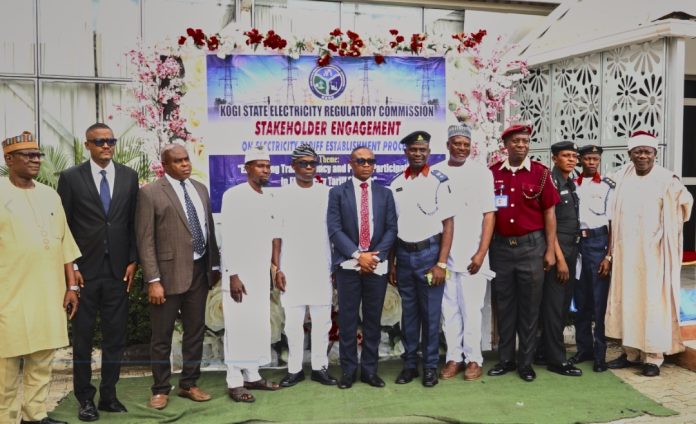The Kogi State Electricity Regulatory Commission (KERC) has reaffirmed commitment to ensuring reliable, affordable, and sustainable electricity for all residents of the state.
This was reiterated on Tuesday during a Stakeholders’ Engagement held in Lokoja, on the Electricity Tariff Establishment Process.
READ ALSO, Kogi East Stakeholders Pass Votes of Confidence on Tinubu, Ododo
Speaking at the event, the Chairman of KERC, Engr. Ibrahim Abdwaris, emphasized the importance of stakeholder engagement in the development of a transparent and people-centered electricity market in Kogi State.
He explained that the establishment of state electricity commissions was made possible by recent federal reforms granting states the authority to regulate electricity within their jurisdictions.
News Hour Video; FG ASSURES OF TIMELY COMPLETION OF ROAD PROJECT IN KOGI
Engr. Abdwaris noted that the tariff-setting process is rooted in principles of fairness, transparency, and sustainability stressing that since its inception, KERC has been working to design an electricity market that reflects the unique realities of Kogi State while aligning with national and global standards.
“No tariff will be approved unless it is fair and truly reflective of current socio-economic conditions. Operators must also be equipped with the necessary resources and incentives to expand infrastructure and enhance service delivery,” he said.
He further stressed the human impact of tariffs, stating, “tariffs are not just about numbers and formulas. It is about the lives of students who need light to study, traders who depend on electricity for their businesses, and industries that rely on power to create jobs.”
To promote accountability, Abdwaris announced the establishment of a Special Electricity Offences Court by the state government, aimed at curbing energy theft and ensuring compliance with payment of electricity bills by consumers.
He also revealed that the forthcoming tariff regime will reflect the diverse realities of both rural and urban communities across the state.
In his remarks, the Commissioner for Rural and Energy Development, Engr. Mohammed Abdulmutalib represented by the Permanent Secretary, Engr. Daniel Onimisi reaffirmed the government’s dedication to ensuring rural electrification.
He noted that improved power supply is essential to advancing industries, supporting small businesses, boosting agriculture, and ensuring development.
“This meeting is a testament to our shared belief that together, we can light up every corner of Kogi State,” he said.
He further explained the reliable electricity is more than power as it is a catalyst for education, healthcare, business, and community development.
Commissioner for Information and Communication, Kingsley Fanwo, called for collaborative efforts in addressing challenges in the state’s electricity sector.
He emphasized the need for KERC to build trust among both electricity providers and consumers, expressing confidence that the state is on a path to transformative progress in the power sector.
Representative of the Nigerian Electricity Regulatory Commission (NERC), Mr. Friday Sule noted that tariff reviews are essential to ensuring all stakeholders have a voice and that tariffs reflect public input.
He praised Kogi’s initiative in developing its own electricity framework and encouraged stakeholders to approach the process with an open mind.
On his part, the Acting Managing Director of Kogi Electricity Distribution Limited, KEDL, Mr. Oluseni Augustine, commended KERC for its efforts to balance the interests of both operators and consumers.
He emphasized that a well-structured tariff system is critical for service delivery, economic development, and investor confidence.
Augustine expressed readiness on the part of KEDL to enhance service delivery, driven by the Commission’s progressive initiatives such as the Special Court and the electricity task force.
He, however, lamented the impact of energy theft, which he said has led to a revenue loss of ₦1.5 billion which has negatively impacted the company’s operations.
He urged members of the public to refrain from acts of sabotage, noting that such behavior threatens the sustainability of power services in the state.
Stakeholders at the event raised a number of concerns, including: Illegal disconnection of electricity supply, variations in unit pricing across different area and need for widespread metering to ensure payment based on actual consumption, clarification of consumer rights, and better understanding of the electricity band classification system.




